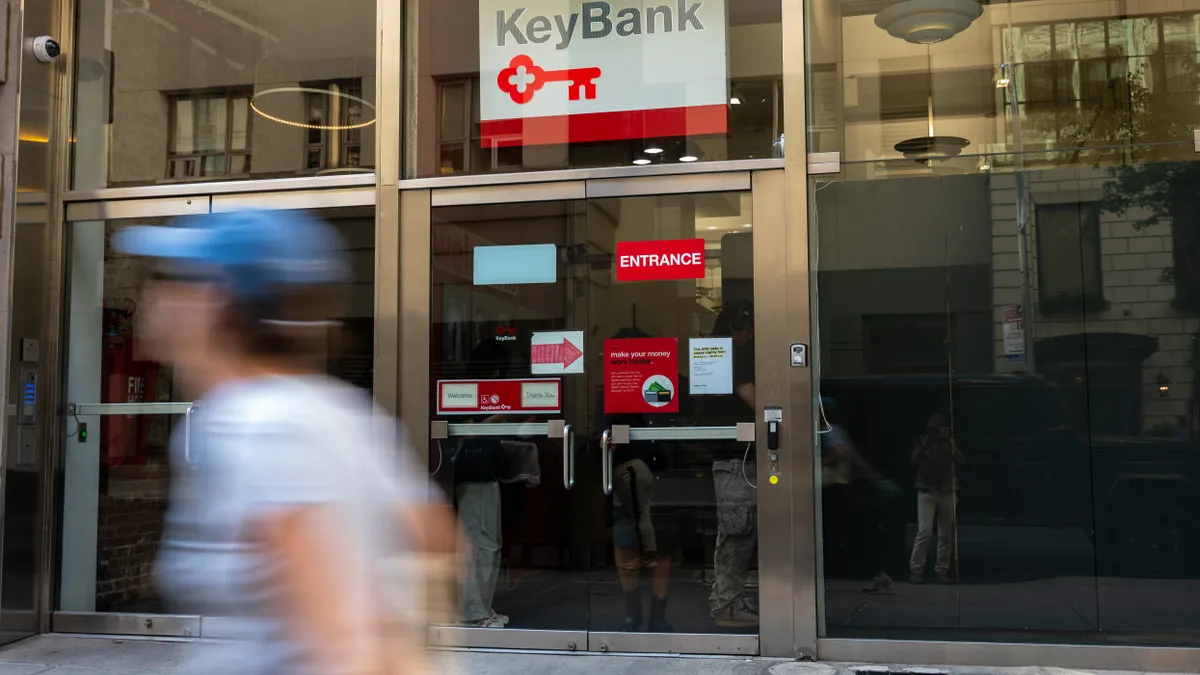The Federal Reserve has approved Scotiabank’s application to acquire up to 14.99% of Cleveland-based KeyBank, the central bank announced Thursday.
The approval means the Canadian lender can proceed with the second phase of its $2.8 billion investment in KeyBank, announced in August. Phase 2 accounts for $2 billion of that money. It will also allow Scotiabank to nominate two directors to KeyBank’s board.
The Fed’s green light comes earlier than expected. Scotia and Key initially projected central bank approval in the first quarter of 2025.
The deal cleared the regulatory hurdle just two days after KeyBank CEO Chris Gorman spoke at the annual Goldman Sachs financial services conference, where he affirmed "the second piece of restructuring … will be contingent on getting [Fed] approval."
Phase 2 will be "based on market conditions and what's out there and what there is to be done," Gorman said Tuesday. "We're in a position where we can do none of it, all of it or some permutation.”
A KeyBank spokesperson declined to comment Thursday. Scotiabank representatives did not immediately respond to inquiries.
In its order Thursday, the Fed said the Justice Department found no significantly adverse effect on competition from the investment: Scotiabank does not control a U.S. commercial bank, and the two banks do not compete directly in any retail market.
The Fed also said the appropriate banking agencies did not object to the investment when given a chance to comment.
In reviewing Scotia’s application, the Fed said it “does not appear” the Canadian lender would control KeyCorp or the holding company’s banking arm.
Scotia, however, would become Key’s largest investor when it does complete Phase 2 of its investment. Scotiabank took an initial 4.9% stake in Key in August, investing $800 million.
That initial investment enabled Key to offload some low-yielding bonds, which triggered a short-term loss, but KeyBank CFO Clark Khayat appeared upbeat on the Scotia combination’s possibilities, while attending a Barclays conference in September.
“Are there certain products that we have that would suit their clients, or products that they have that would suit our clients, that we could basically white-label to each other?” Khayat posed, at the time.
Of the four largest Canadian banks, Scotiabank has, by far, the smallest presence in the U.S. — historically, it has opted instead to invest in Latin America, where it has the largest foothold of any Canadian lender.
Scotiabank CEO Scott Thomson, however, has considered exiting some unprofitable markets in South America, and prioritized moving capital from developing markets to developed ones, according to Reuters.
The KeyBank investment represents “a low-risk, low-cost optionality in North America” with strong returns, he said.
That stands in great contrast to recent efforts by Scotia’s Canadian peers to expand in the U.S.
TD’s proposed $13.4 billion acquisition of Memphis, Tennessee-based First Horizon was derailed in 2023, when the banks terminated their agreement — presumably in connection with the revelation of anti-money laundering deficiencies at the Canadian lender.
TD agreed in October to pay more than $3 billion in penalties after a multiagency investigation on suspicion that millions of dollars tied to the illicit drug fentanyl funneled through the bank. TD also agreed to have its U.S. retail assets capped at $434 billion, which will stunt the bank’s earlier announced plans to open 150 branches in the southeastern U.S. by 2027.
Another Scotia peer, Royal Bank of Canada, has also weathered recent woes in the U.S. RBC infused $2.95 billion into its U.S. subsidiary, Los Angeles-based City National, in 2023 to boost its capital. The bank also appointed former Fifth Third CEO Greg Carmichael to chair City National and help strengthen the lender’s platform and drive growth.
The Office of the Comptroller of the Currency, though, fined City National $65 million in January and mandated that the bank improve its strategic plan, as well as its compliance risk management related to AML and fair lending, investment management practices and deficiencies in reporting events that pose operational risks.
Fellow Canadian lender BMO in 2022 boosted its U.S. presence through a $16.3 billion acquisition of BNP Paribas’ former U.S. retail arm, San Francisco-based Bank of the West.
Thursday’s approval, though, may pave the way for Scotia to cement growth in the U.S. without the retail footprint that has appeared to serve as a thorn in the side to its Canadian competitors.























